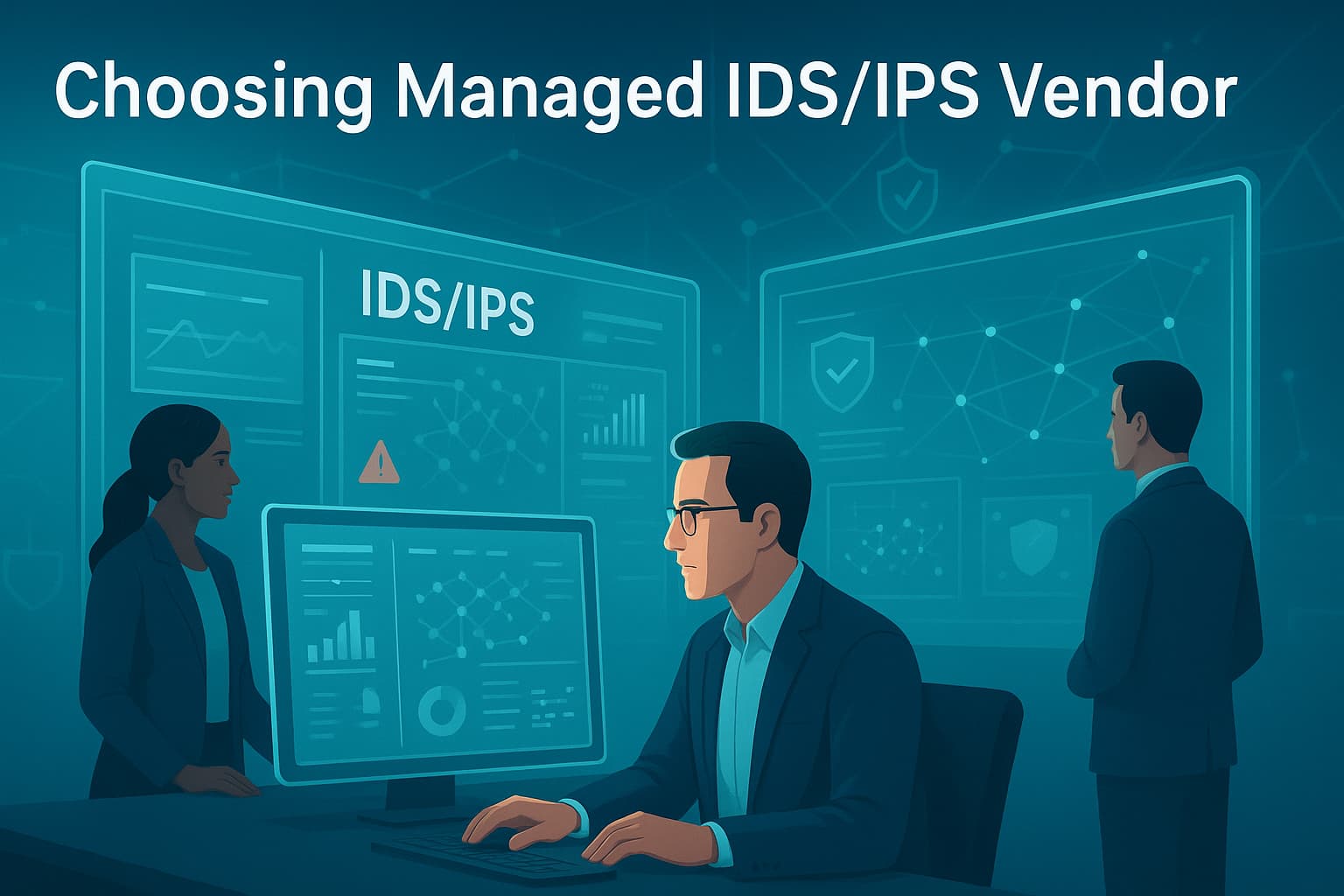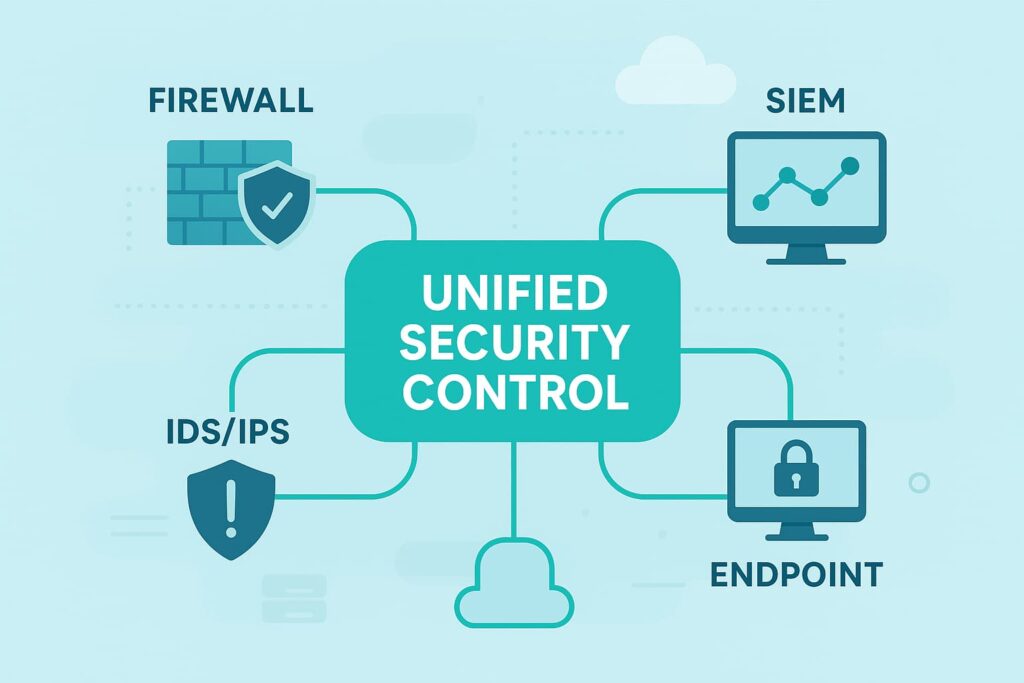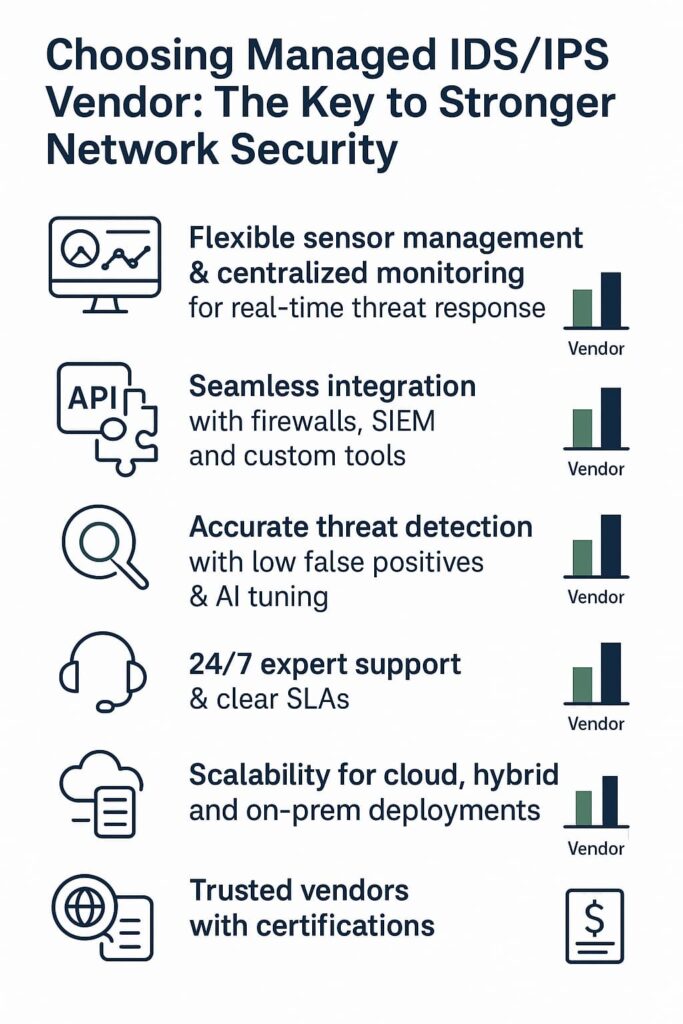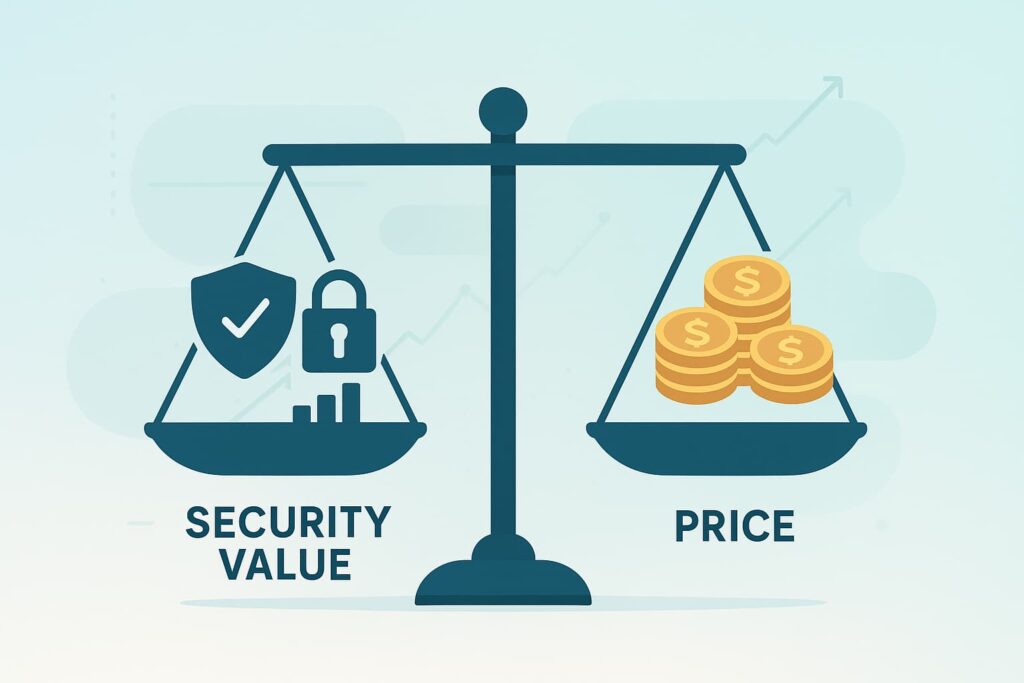Address
304 North Cardinal St.
Dorchester Center, MA 02124
Work Hours
Monday to Friday: 7AM - 7PM
Weekend: 10AM - 5PM
Address
304 North Cardinal St.
Dorchester Center, MA 02124
Work Hours
Monday to Friday: 7AM - 7PM
Weekend: 10AM - 5PM

Choosing managed IDS IPS vendor is key to your network’s long-term security. A reliable partner protects your data, lowers risks, and supports your team without extra work. Top vendors do more than detect threats. They provide flexible sensor management, easy integration, and reliable support to strengthen your defenses.
The right choice boosts both your protection and confidence in security. How do you find the best fit? Keep reading to explore the key factors that matter most when choosing a managed IDS/IPS vendor for your organization.
Security teams need tools that speed up their work, not slow it down. Our audits show that many MSSPs struggle with vendors who promise “easy” dashboards but provide complicated systems. These systems waste analysts’ time.
A good management console should allow easy setup and adjustment of sensors. Users shouldn’t have to dig through endless menus. We’ve found that flexible deployment options, cloud, on-prem, or hybrid, help teams work better and keep clients happy.
Many vendors claim to offer “centralized monitoring,” but the real test is managing multiple client environments at once.
In our experience, analysts work best with tools that have:
We’ve tested many systems ourselves, and it’s easy to spot which ones truly make life easier. Flexibility and simplicity always stand out. [1]

MSSPs can’t afford to deal with isolated security tools. Real-world experience shows that solid API support isn’t just nice to have – it’s essential. This also includes configuring IDS IPS rules and alerts to ensure consistent communication between firewalls, SIEM platforms, and endpoint systems.
The best vendors we’ve worked with provide clear documentation and actual support for integrating with:
Our testing process always includes trying to break these integrations, because that’s exactly what happens in production environments. When vendors claim “seamless integration,” we make sure it’s not just marketing speak.
Credit: Rajneesh Gupta
False positives waste time, drain resources, and cost clients money. Our evaluations show that even advanced analytics and proper IDS/IPS management need good tuning options to be effective. MSSPs require tools that adapt to different client environments without constant manual changes..
The real value lies not just in having AI or machine learning. It’s in how well these tools reduce the analyst’s workload.
We focus on systems that offer:
Updates and signature changes should happen smoothly, without downtime or breaking existing settings. We’ve learned this from experience, which is why accuracy and stability are top priorities in every product we review.
When outsourcing IDS/IPS management, vendor expertise is key. We’ve partnered with providers who managed sensors and shared valuable insights. They responded quickly during incidents. Choose vendors that offer 24/7 monitoring and have a strong track record in managed security.
It helps when vendors support co-management. This setup keeps your team involved while using the vendor’s skills. Working together boosts your security and efficiency.
Ask yourself:
A skilled managed service provider should feel like part of your security team, not just another vendor. [2]
Security needs evolve as networks grow and threats become more complex. We’ve seen organizations struggle with vendors who can’t scale or adapt their IDS/IPS offerings. Choose a vendor whose solution accommodates increasing traffic loads and emerging technologies without performance degradation.
Flexibility to support cloud deployments, hybrid environments, and integration with new security tools ensures your investment remains solid over time. This adaptability is essential for future-proofing your security posture.
Consider vendors that offer:
This foresight saves you from costly replacements or upgrades down the line.

Security incidents don’t keep office hours. We’ve all felt the frustration of slow vendor responses during crucial times. A reliable managed IDS/IPS vendor offers 24/7 intrusion monitoring and dependable technical support. They provide clear service level agreements (SLAs) that specify response and resolution times..
Transparent contracts outline scope, responsibilities, and costs. This clarity helps avoid misunderstandings and ensures accountability. When choosing vendors, remember to consider:
Around-the-clock access to skilled support staff (no bots)
Strong support turns a vendor from a passive service provider into a trusted security partner.
It’s easy to choose the cheapest or most popular vendor. But reputation and experience are more important. Check customer testimonials, case studies, and industry awards to assess reliability.
Certifications like ISO 27001 or SOC 2 show a vendor’s commitment to security and quality. These credentials give you confidence that your partner meets high standards.
Ask for:
Vendor credibility is the foundation for a long-term, worry-free relationship.

Not all vendors have the same pricing. Some services use monthly subscriptions. Others charge by usage or have different prices based on features. We recommend matching your budget to the service level and value you need. Don’t just pick the cheapest option.
Be cautious of hidden fees or unclear contracts that could raise costs later. A straightforward pricing model helps you budget and see the true return on your investment.
Look for vendors that provide:
Investing in quality managed IDS/IPS services reduces the risk of breaches and helps avoid costly downtime.
When choosing a managed IDS IPS vendor, look for strong threat detection, real-time threat monitoring, and easy firewall integration. The vendor should offer both intrusion detection system and intrusion prevention system options with scalable security solutions.
Also, check for responsive vendor support, flexible deployment, and features like false positive reduction and automated threat response.
A managed IDS IPS improves network security by using intrusion detection and prevention systems to find and block threats before they spread. It uses tools like deep packet inspection, anomaly detection, and behavior-based IDS to monitor traffic.
Combined with network segmentation and endpoint protection, it helps reduce risks and keeps systems safe.
A signature-based IDS looks for known attack patterns or intrusion signatures, while a behavior-based IDS watches for unusual activity that might signal a new or unknown threat. The best managed IDS IPS setups use both, balancing accuracy and proactive defense for stronger threat detection and fewer false positives in network monitoring.
IDS IPS can connect with other cybersecurity solutions through SIEM integration, firewall policies, and threat intelligence sharing. It helps with log analysis, compliance monitoring, and incident response.
With automated threat response and security orchestration, it becomes part of a multi-layer security approach that strengthens protection across your entire network environment.
The right partner should make things easy, helping you manage sensors, connect systems smoothly, spot real threats, and give steady support. From our experience, it works best when you stay in charge but use the vendor’s knowledge to guide you. Always test and compare vendors by trying their demos first.
Join our consulting service for expert help made for MSSPs. With over 15 years of experience and 48K+ projects done, we’ll help you pick the best vendor, improve your security tools, and make smart choices to keep your network safe and ready for the future.